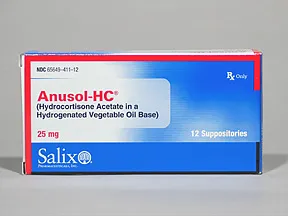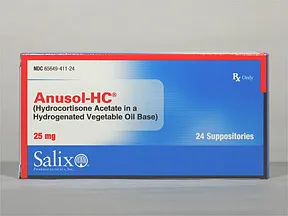Do not share this medication with others.
Lab and/or medical tests (such as rectal exams, adrenal gland function) should be done while you are using this medication. Keep all medical and lab appointments. Consult your doctor for more details.
This medication is used to treat hemorrhoids and itching/swelling in the rectum and anus. It is also used with other medications to treat certain intestinal problems (such as ulcerative colitis of the rectum and other rectal/anal inflammatory conditions). Hydrocortisone suppositories help to relieve rectal pain, itching, bloody diarrhea, and bleeding by reducing swelling (inflammation) directly in the rectum and anus. Hydrocortisone belongs to a class of drugs called corticosteroids.
Use this product in the rectum as directed by your doctor, usually 2 or 3 times daily. The dosage and length of treatment are based on your medical condition and response to treatment.
Avoid handling the suppository for too long because it will melt. Unwrap the suppository. You may moisten the tip with a few drops of water. Lie down on your left side with your right knee bent. Gently push the suppository, pointed end first, into the rectum with your finger, deep enough so it does not slide back out. Remain lying down for a few minutes. Avoid having a bowel movement for at least 1 hour so the medication will have time to work.
Wash your hands after each use. Note that this medication may stain fabric.
Use this medication regularly as prescribed to get the most benefit from it. Do not use more of this product, use it more often, or use it for longer than prescribed. Your condition will not improve any faster, and your risk of side effects may increase. If you have been using this medication for a long time, do not stop using it without consulting your doctor. Some conditions may become worse when the drug is suddenly stopped. Your dose may need to be gradually decreased.
Tell your doctor if your condition does not improve after your prescribed length of treatment or if it worsens.
Burning, itching, dryness, skin/hair follicle irritation, and changes in skin color around the rectal area may occur. If any of these effects last or get worse, tell your doctor or pharmacist promptly.
Remember that this medication has been prescribed because your doctor has judged that the benefit to you is greater than the risk of side effects. Many people using this medication do not have serious side effects.
Tell your doctor right away if you have any serious side effects, including: rectal bleeding that is new or doesn't stop, unusual bruising/bleeding, symptoms of stomach/intestinal bleeding (such as stomach/abdominal pain, black/tarry stools, vomit that looks like coffee grounds), bone pain, easily broken bones, mental/mood changes (such as depression, mood swings, agitation), muscle weakness/pain, irregular heartbeat, signs of infection (such as sore throat that doesn't go away, fever, painful urination, worsening redness/irritation near the anus).
Rarely, it is possible this medication will be absorbed into the bloodstream. This can lead to side effects of too much corticosteroid. These side effects are more likely in children and people who use this medication for a long time. Tell your doctor right away if any of the following side effects occur: unusual/extreme tiredness, weight loss, headache, swelling ankles/feet, increased thirst/urination, vision problems.
A very serious allergic reaction to this drug is rare. However, get medical help right away if you notice any symptoms of a serious allergic reaction, including: rash, itching/swelling (especially of the face/tongue/throat), severe dizziness, trouble breathing.
This is not a complete list of possible side effects. If you notice other effects not listed above, contact your doctor or pharmacist.
In the US - Call your doctor for medical advice about side effects. You may report side effects to FDA at 1-800-FDA-1088 or at www.fda.gov/medwatch.
In Canada - Call your doctor for medical advice about side effects. You may report side effects to Health Canada at 1-866-234-2345.
Before using hydrocortisone, tell your doctor or pharmacist if you are allergic to it; or to other corticosteroids (such as prednisone); or if you have any other allergies. This product may contain inactive ingredients, which can cause allergic reactions or other problems. Talk to your pharmacist for more details.
Before using this medication, tell your doctor or pharmacist your medical history, especially of: other stomach/intestinal problems (such as ulcers, blockage, bleeding, infection, recent surgery), infections (such as tuberculosis, fungal infections), certain eye conditions (cataracts, glaucoma, herpes infection of the eye), heart problems (such as heart failure, recent heart attack), high blood pressure, liver disease, kidney disease, thyroid problems (overactive or underactive thyroid disease), diabetes, bone loss (osteoporosis), bleeding or blood clotting problems, mental/mood conditions (such as psychosis, depression), low potassium blood level.
Limit alcoholic beverages while using this medication to decrease the risk of stomach/intestinal bleeding.
Rarely, using corticosteroid medications for a long time can make it more difficult for your body to respond to physical stress. Before having surgery or emergency treatment, or if you get a serious illness/injury, tell your doctor or dentist that you are using this medication or have used this medication within the past few months.
Tell your health care professional that you are using hydrocortisone before having any immunizations, vaccinations, or skin tests. Avoid contact with people who have recently received live vaccines (such as flu vaccine inhaled through the nose).
Rarely, this drug can make you more likely to get infections or may make current infections worse. Stay away from anyone who has an infection that may easily spread (such as chickenpox, COVID-19, measles, flu). Talk to your doctor if you have been exposed to an infection or for more details.
Older adults may be more sensitive to the side effects of this drug, especially bone loss/pain, stomach/intestinal bleeding, and mental/mood changes (such as confusion).
Though it is unlikely, this medication may temporarily slow down a child's growth if used for a long time. See the doctor regularly so your child's height can be checked.
During pregnancy, this medication should be used only when clearly needed and not for prolonged periods. Other forms of hydrocortisone (given by mouth or by injection) may harm an unborn baby. Discuss the risks and benefits with your doctor.
It is unknown if this drug passes into breast milk. However, it is unlikely to harm a nursing infant. Consult your doctor before breastfeeding.
Drug interactions may change how your medications work or increase your risk for serious side effects. This document does not contain all possible drug interactions. Keep a list of all the products you use (including prescription/nonprescription drugs and herbal products) and share it with your doctor and pharmacist. Do not start, stop, or change the dosage of any medicines without your doctor's approval.
Some products that may interact with this drug are: aldesleukin, "blood thinners" (such as warfarin), desmopressin.
Check all prescription and nonprescription medicine labels carefully since many medications contain pain relievers/fever reducers (including aspirin, salicylates, NSAIDs such as ibuprofen, naproxen) that may increase your risk of bleeding when taken with corticosteroids. However, if your doctor has directed you to take low-dose aspirin for heart attack or stroke prevention (usually 81-162 milligrams a day), you should continue taking the aspirin unless your doctor instructs you otherwise. Ask your pharmacist about using those products safely.
This medicine may be harmful if swallowed. If someone has overdosed and has serious symptoms such as passing out or trouble breathing, call 911. Otherwise, call a poison control center right away. US residents can call their local poison control center at 1-800-222-1222. Canada residents can call a provincial poison control center.
Do not share this medication with others.
Lab and/or medical tests (such as rectal exams, adrenal gland function) should be done while you are using this medication. Keep all medical and lab appointments. Consult your doctor for more details.
If you miss a dose, use it as soon as you remember. If it is near the time of the next dose, skip the missed dose. Use your next dose at the regular time. Do not double the dose to catch up.
Store at room temperature away from heat. You may store this medication in the refrigerator to keep it from melting. However, do not freeze. Keep all medications away from children and pets.
Do not flush medications down the toilet or pour them into a drain unless instructed to do so. Properly discard this product when it is expired or no longer needed. Consult your pharmacist or local waste disposal company.

Anusol-HC 25 mg rectal suppository
Color: whiteShape: torpedoImprint:This medicine is a white, torpedo, suppos

Anusol-HC 25 mg rectal suppository
Color: whiteShape: torpedoImprint:This medicine is a white, torpedo, suppos